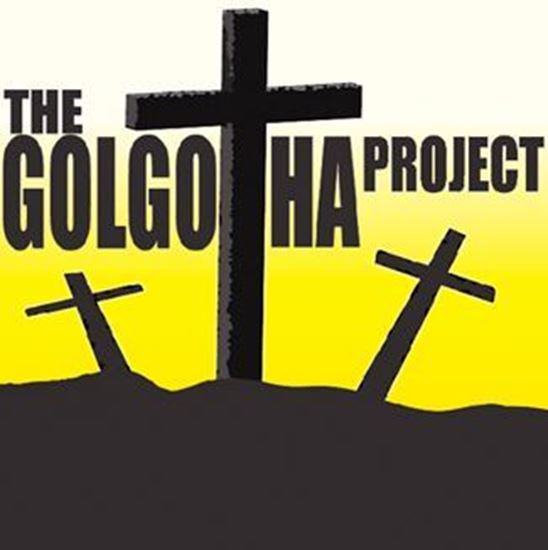
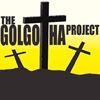
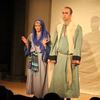


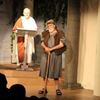
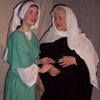

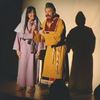
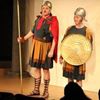
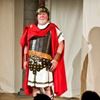
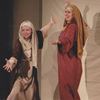

The Golgotha Project
The story of Jesus' death and resurrection truly is "the greatest story ever told." But why is it so often told in ponderous and arch fashion? "The Golgotha Project" brings to life the people of 2,000 years ago by finding the humor and humanity in them. The story is told in a series of amusing monologues, dialogues and brief scenes involving people who witnessed the events in Jesus' time. The show is very modular. Productions can either choose to eliminate certain scenes or characters with little effect on the overall show. This Easter story is fresh and entertaining yet profoundly moving as it ends on the shadow of the cross and the words of Jesus. About 90 minutes.
Productions
Behind The Scenes
With Jeff Zimmer
What inspired you to write this play?
I saw a friend's son in a production of "The Laramie Project" and loved the techniques of using monologues, dialogues and interviews to tell the story. So, I decided to apply those same techniques to the story of Jesus. Growing up I'd watched a lot of biblical films and they always seemed very arch and ponderous. "The Greatest Story Ever Told" should not be boring, yet often it came out that way.
It seemed to me that the humanity of the story had often been lost. By making the characters in "The Golgotha Project" more human and bringing out the funny parts of them I think I made the story more real, entertaining and accessible to today's audiences.
I also really feel God was my co-pilot on this project, constantly giving me ideas and inspiration to make the show work.
What's your favorite part or line in the play? Why?
My favorite line is when the Malchus the slave tells Jacob one of Jesus disciples cut off his ear and Jacob looks at him, sees Malchus has two ears and asks "He cut off your ear? You're saying you had three?"
As a big fan of classic comedy teams, I love the scenes with my Laurel and Hardy clones Stahn and Ali. I also like the Rumani Brothers and "Doubting" Duffo. These days every time in church I hear the story of Jesus coming to town on a donkey, I can't help but think of Avis and her donkey rental agency. Deli and Choopas' account of what they saw on Golgotha is a wonderful two-person comedy scene. The moment with Cleo and Louks, the worshippers of ancient Egyptian Gods was a funny add in a later production of the show.
But my favorite part is probably the monologue by Gretch. He was the blind man whose sight Jesus restored. Gretch says after he saw what happened to Jesus on the cross, he wished he was still blind. Audiences were very moved. It was a chilling moment.
Like most comedy writers, to me finding the funny is the easy part. Finding moments like that one with Gretch is hard but most satisfying.
Why did you choose these characters?
It was important to me not to use any of the main figures from the Bible--Jesus or any of the disciples, Pilate or even Barrabas. To write lines for Biblical characters like these is a daunting challenge for any writer and I can see how trying to put comedy wisecracks in their mouths might be considered offensive or in bad taste. As a Christian that's the last thing I wanted to do. So instead, I made up a bunch of characters that are not in the Bible (with the exception of Simon of Cyrene) whose humanity I could explore and tell the story in a fresh, new way that used the comic talents God has given me.
What did you try to achieve with this play?
Using humor is a proven way to get one's point across. I wanted to write a show that would tell of Jesus' crucifixion and resurrection in an entertaining way that hadn't been done before yet remained true to the story. After all, the audience knows how this story begins and how it ends coming into the theater. It's how you tell that story that makes the difference. I wanted to write a show that not only Christians would enjoy but non-Christians as well. What better way to get the unchurched to listen to Christ's story than to get them laughing, enjoying themselves and wanting to hear more? As is written in Genesis 21:6: "God has brought me laughter, and everyone who hears about this will laugh with me."
Do you have anything else you'd like to add?
This show is very modular. I cut some scenes from the first production and wrote new ones for the next. Some scenes have been excerpted for Lenten dramas. In some productions they cut some scenes because they didn't have enough people to do it all. We did the original production with 29 people in it because so many people wanted to be in the show. It was very flattering. In the revised second production I cut some characters and added some new ones. We did that version with only 11 actors. The beauty of this show is you can do it with a lot of people or with a lot of doubling and tripling, do it with only a few. I'm curious what the absolute minimum number of actors would be. I think probably about 7 or 8. But frankly it's more fun with more people involved.
